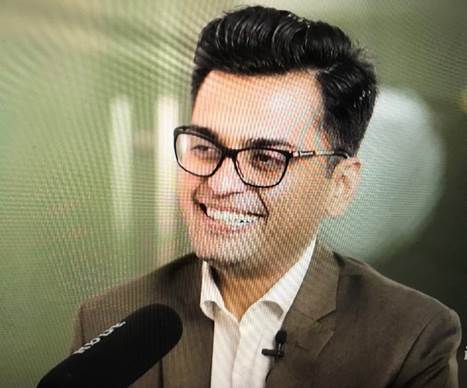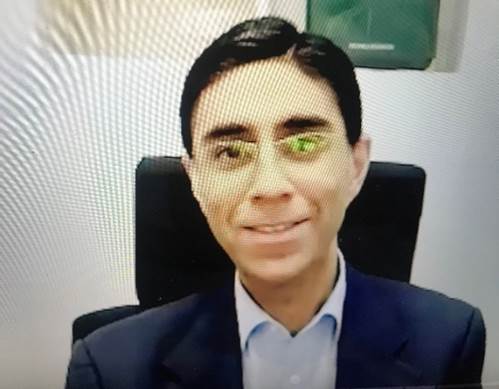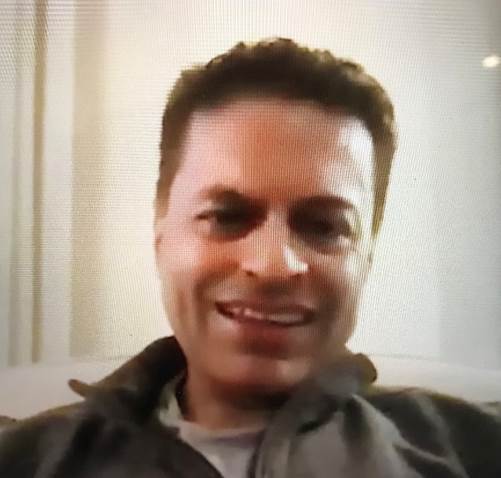
Usama Nizamani

Dr Moeed Yusuf

Fareed Zakaria
InferTalks Hosts Fareed Zakaria, Moeed Yusuf to Discuss Changing Global Order
By Elaine Pasquini

Washington: CNN journalist Dr Fareed Zakaria and former national security advisor to Pakistani Prime Minister Imran Khan, Dr Moeed Yusuf, were the special guests on the June 13, 2023, episode of InferTalks, a digital platform offering news and insights on global issues hosted by senior researcher Usama Nizamani. The two experts discussed the changing global order in light of the US-China dynamic.
Asked about the state of US foreign policy and whether the United States’ influence as a global power is waning, Zakaria responded: “That’s not the case,” but it may seem that way because of “the rise of everyone else.”
“What is happening in the world is the rise of other countries that have up until now been sort of pawns on the chessboard played by somebody else…the United States, the Soviet Union,” he said. “And what is happening is that these countries are becoming powerful regional powers on their own, in some cases more than regional powers.”
Zakaria pointed to countries such as Turkey, Saudi Arabia, India, Pakistan, and Brazil, which have become “much more willful, economically powerful, culturally proud, politically active.” And China is at the top of that list, he insisted. “I think it is really important to understand that it’s a global phenomenon.”
Speaking about China being the dealmaker in the case of Iran and Saudi Arabia’s new relationship, Zakaria explained that it was partly a result of China’s rising economy. In 1990, he said, China’s GDP was1.5 percent of the global GDP and today it has increased to 17 or 18 per cent of global GDP. “That kind of rise in economic power naturally is going to have some spillover effect in political and diplomatic power,” he argued. “China has become a very important player.”
But now, “we are left in this very complex, nerve-wracking hair-raising world in which we are economically very integrated but increasingly geopolitically very hostile,” Zakaria said, which makes it difficult for American companies doing business with China.
With respect to India, Zakaria argued that “India is trying to maintain a kind of multi-aligned foreign policy. This is evident in India not condemning Russia for invading Ukraine and continuing to buy Russian arms. Ninety percent of advanced weaponry in the country is imported from Russia and they continue to buy Russian oil.” But India is more closely aligned with the United States when it comes to issues relating to China.
Regarding Pakistan, the country “is actually much more open as an economy,” than India, Zakaria said. “Pakistan never went through the kind of crazy socialist phase in the 1970s that India went through,” he added. And, according to the World Bank’s ease of doing business index, “Pakistan is always higher than India, often substantially higher.”
Turning to Yusuf, Nizamani asked him how Pakistan can balance its relations with both the United States and China. The former national security advisor responded that Pakistan is dependent on both countries, noting their geographical continuity with China. In addition, the China-Pakistan Economic Corridor (CPEC) investments in Pakistan have expanded the country’s energy and infrastructure. At the same time, Pakistan’s export market is integrated with the West. “Much of our culture is integrated with the West,” he pointed out. “We have a special relationship with China, we want to keep that going. We have an extremely important relationship with the West and have been a frontline ally of the US and want to keep that going.”
Yusuf went on to explain that for some time, including when he was in the Pakistani government last year, the number one foreign policy challenge for Pakistan was to navigate the “great power contestation” between the US and China. Almost all of Pakistan’s economic output goes to the West, he said, but over time the country’s imports started coming from China. “So, Pakistan is dependent on both blocs and that is why Pakistan pushes for no camp politics, for cooperation in our region, and for a conversation on how to bring both camps to come and invest in Pakistan,” he explained.
If Pakistan becomes a hub of connectivity for the region, that will benefit both the US and China, and “Pakistan could help to lower the temperatures and work with both countries,” he added.
One problem, however, between the US and China, Yusuf said, is a communication gap. “I think we are heading towards a security dilemma because both sides are misinterpreting or perhaps reading way too much into what the other side is saying.” He would like to start a “dialogue of ex-officials, intellectuals and others to talk about what countries like Pakistan and others can do…to lower the temperature of this relationship” between the US and China.
Yusuf expressed concern that the global dynamic is changing. “I don’t think the US is as well-positioned as it was to play mediator in crises between India and Pakistan,” he stated. “I don’t think the Chinese are ready and I don’t think the Americans are there anymore. I think there is a bit of a vacuum in that space but overall, in terms of conflict resolution, I just find the current Indian government having a very warped view of Pakistan. It’s a very sad day for somebody who has advocated the need for a better relationship all my academic life.”
Yusuf fears the world is headed to “a sort of camp formulation” which could sweep issues of climate change and natural disasters aside. “We may not be able to manage this globe unless we can sensibly cooperate – big and small powers; and my biggest worry is that I am beginning to see more lip service than action in that space,” he concluded. “That, to me, is probably the frontier to cross first. If we manage that, I think there’ll be other opportunities to cooperate as well.”
(Elaine Pasquini is a freelance journalist. Her reports appear in the Washington Report on Middle East Affairs and Nuze.Ink.)

